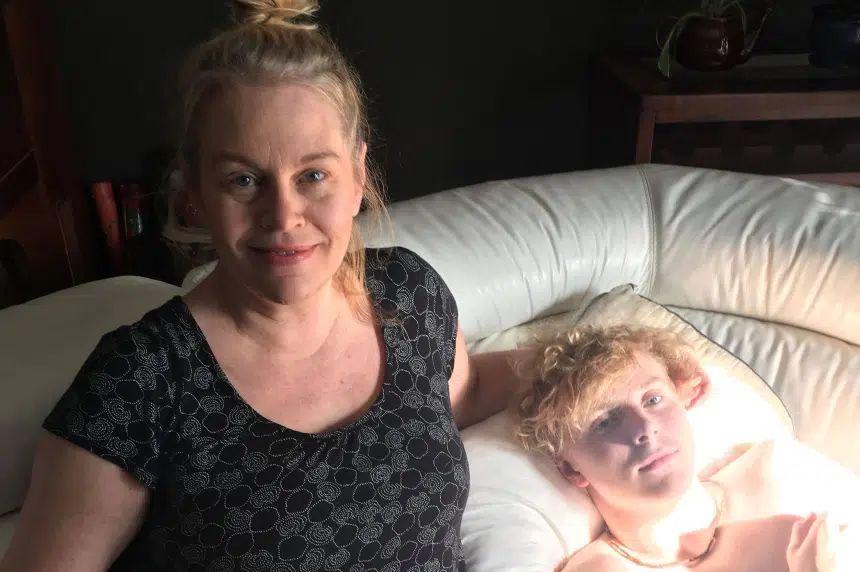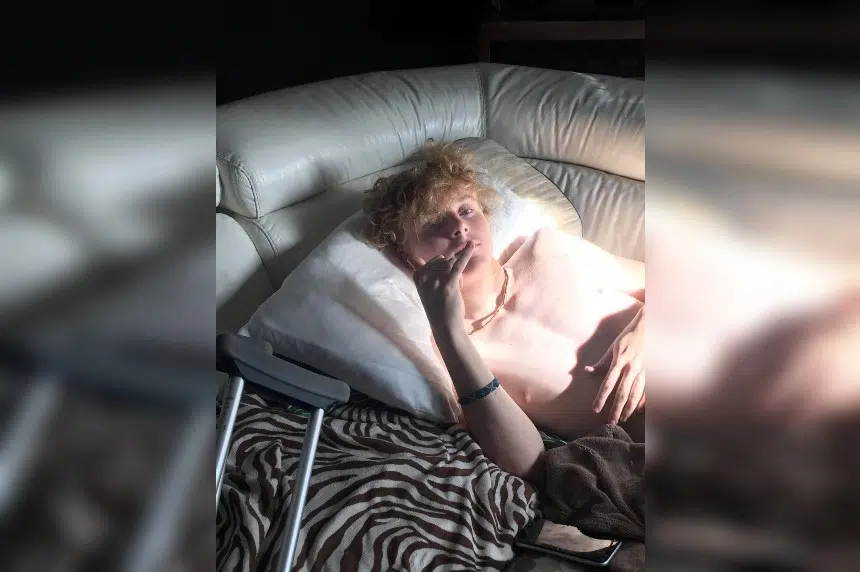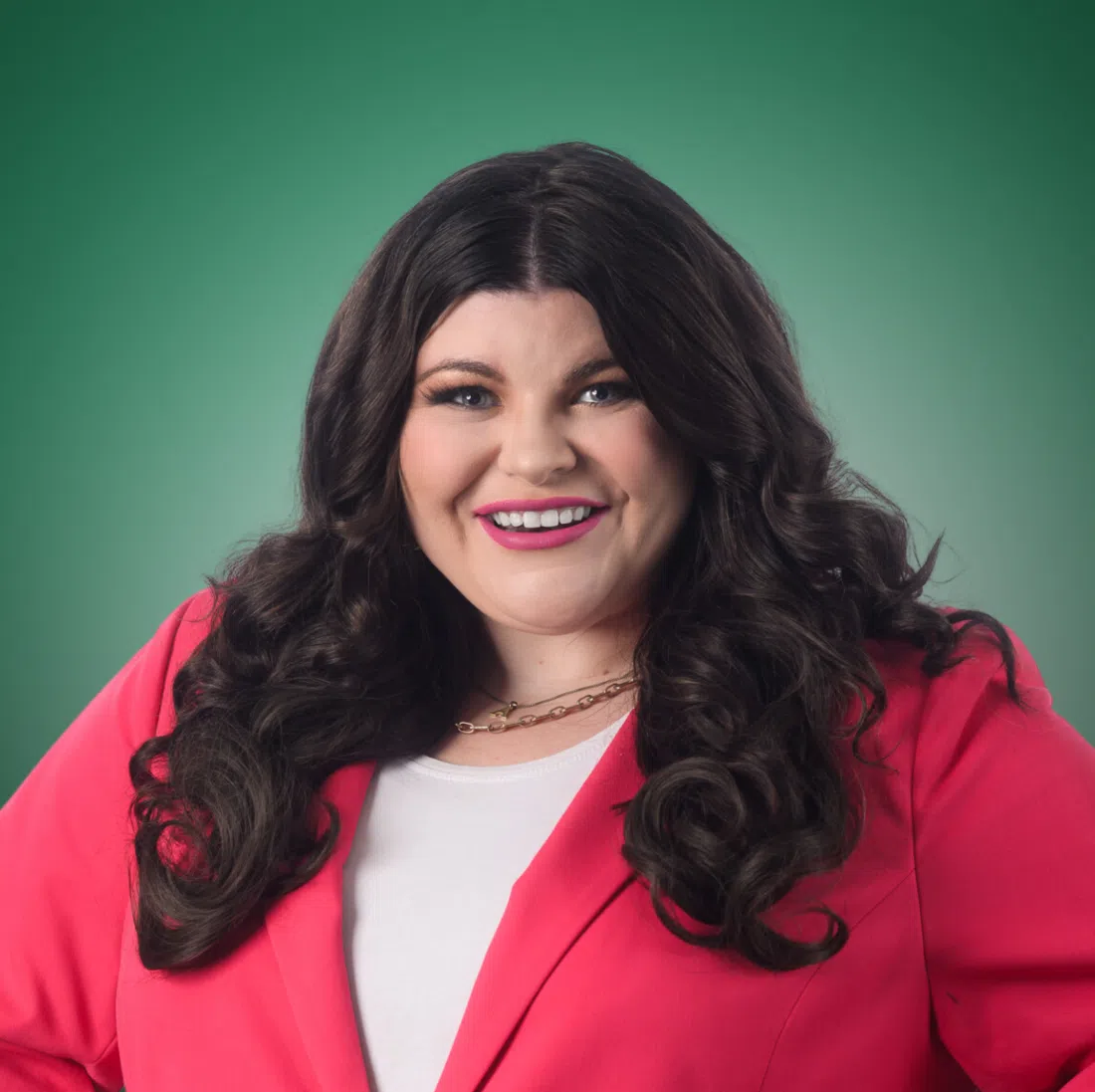Luke Schofield was a healthy 17-year-old as he headed into his senior year at Dr. Martin LeBoldus High School in Regina.
He was one of the captains of the Golden Suns football team, with aspirations of scholarship opportunities and a chance at the college or university ranks.
Now, his mother, Caron Schofield, just hopes her son will be able to walk again — sometime soon.
“I don’t care about football anymore. I just want my kid to walk again and be able to live like a 17-year-old, healthy boy should be able to live — nothing else matters. Football is just football,” she said.
Luke was playing in the spring league and all-star leagues heading into his senior year. The multi-position standout simply took one hit during a game in Saskatoon this summer, according to his mother.
“From that point, (his knee) would be a little bit sore. He started limping and he was doctoring it a little bit. Then it got to the point where it was an issue. He was having a lot of trouble getting around. (I) ended up taking him to the hospital one day when he called me crying,” Caron said.
She took him in on Aug. 22, when he was recommended to an orthopedic surgeon with a further recommendation for an urgent MRI. Typically, those are scheduled within about five days.
But not with current COVID-19 stresses on the health system.
“In the interim, he was getting worse and worse. They sent us to physio (and) we tried that. (We) did everything that we were informed to do by the doctors with no diagnosis but trusting that we had to do something to get this kid moving,” Schofield continued.
Luke ended up not being able to handle the physio, nor could he walk or sleep. He has even stopped eating, losing out on the sport he loves.
“He has been now — at this point — in bed for two weeks on pain meds. I wake up to him crying. This is how we start our days and middle of the nights,” Caron said. “Finally, (I) couldn’t deal with it anymore and made the call. We got into a private MRI (Tuesday).”
The private MRI cost the family $1,500. Because of the severity of the swelling, additional tests were needed.
“Everything’s pointing to him needing surgery. Now, of course, that’s the big scare to us is how long to go on to get him this surgery (and) get him that help,” Caron said before explaining what she was told by a nurse.
“(The nurse said) ‘Just with the way things are right now, we’re looking at least a month. At least.’ And you kind of cling to what you’re told, but it dawned on me quite quick on that month, it didn’t mean anything.”

Caron and her son Luke Schofield are waiting for their next step following a knee injury to her only son, and wait lists are affected by a strain on the health system due to COVID-19. (Caron Schofield/Submitted)
‘It puts me in a state of panic’
Caron said she isn’t blaming any health-care workers when it comes to the current state of the system.
Due to the system’s strain, thanks to additional COVID patients and a surge in cases across the province, surgeries in the province have been pushed back, treatments have been rescheduled, and staff has been redeployed.
Caron said she understands many families are in a position way worse than her own, but that doesn’t change how she feels when she hears her son’s pain.
“It puts me in a state of panic. It was really a lot of worry. Now it’s shifted to panic, absolute panic, frustration and anger. I feel like I have nowhere to turn … nothing I can tell this boy of mine to make him feel like he’s seeing that we’re not helping; that we’re not doing the best that we can. How do you explain to him that we are taking every route that we can, and we keep getting stopped?” she said.
Caron worries because she doesn’t see the COVID rise letting up anytime soon. That has her son’s future in a delicate position.
“He is so zoned out on the meds. (He’s) not seeing his friends, he hasn’t been to school. This is his senior year, he’s the captain of his football team — he’s missing all these things,” she said.
“It’s heartbreaking to watch him. This is not my kid; this is not him.”
‘Nothing we can do but wait’
On Monday morning, Caron had had enough. She was woken up by the screams of her son from the pain.
She was trying to avoid a 9-1-1 call or a trip to the hospital. She said she had heard the stories of long wait times and knew Luke didn’t have it in him to sit in a vehicle, let alone a waiting room for hours on end.
But with the pain increasing, a call for an ambulance was made — but her worries were a reality once they made it into Regina’s Pasqua Hospital.
“They were fantastic. We got in there (and), of course, he was hustled in right away. The folks that were sitting in that waiting room when we got there were still sitting there at 6 o’clock when we left,” Caron said.
At 3 p.m., an announcement came over the intercom that the facility had reached capacity, that no more admissions would be taken. Schofield described her feelings, along with other temporary changes made to the facility in the meantime.
“A couple of hallways had then been shut down and were now being converted into rooms and wards … That resonated with me when I left, really wrapping my brain around that. I can’t imagine those people sitting there waiting … If I hadn’t taken an ambulance in, that would have been us waiting, going ‘What do we do now?’ I know we’re not alone,” she said.
Caron has three children, Luke and two older daughters.
She is no stranger to the health system, but she said she hasn’t ever seen the system look like it did on Monday.
“We’ve been in and out of the hospital with this and that over the years. There wasn’t a lot of extra, added conversations. It felt almost robotic. People just putting in, doing the same thing day after day … It was plain to see to the eye that it was already so strained, you could almost feel the stress in the air,” she said.
Their next move is to meet with a surgeon Thursday. After that? Things don’t look as clear.
“I have no idea …,” Caron said. “I’m petrified because when he tells us he’s going to need surgery, what comes out of his mouth after that? I really have no idea where we’re going.”
‘Just go get a vaccine’
Of Saskatchewan’s COVID vaccine-eligible population, just over 78 per cent have received at least one dose. Nearly 70 per cent of the vaccine-eligible population is fully vaccinated.
On Tuesday, Caron posted a status to Facebook, pleading for people to go get vaccinated.
She has a message for those who haven’t rolled up their sleeves to this point.
“I acknowledge to the people who don’t want to be (vaccinated). I also acknowledge that I’ve spent the past how long now watching my 17-year-old boy cry in pain — waiting for MRIs, waiting to hopefully get a surgery, pleading for some sort of an answer and it’s not coming,” she said.
“It’s an uphill battle all the way through. So I ask people, please just go get a vaccine. That’s all you have to do … This message wasn’t to be put out to start a hatred conversation or a ‘my opinion, your opinion.’ These are the facts. I’m not a doctor. I listen to the professionals, and I wish everyone else did too.”
Schofield said she didn’t expect to be in this position herself.
Now that she is, however, she sees how delicate the health-care system is — adding people aren’t going to understand until it happens to them.
“Everybody can be one step away from a serious health crisis with loved ones or friends, and you don’t know how you’re going to deal with those,” she said. “Until you get to that point, I don’t know how people don’t see it.”











